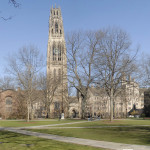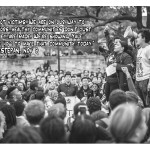by Dhikshitha Balaji
It is clear that the Yale English Department’s major for undergraduates must be restructured. A few weeks ago, Adriana Miele published an article in the Yale Daily News observing that “the department educates its students in venerating the English canon” and thus “actively contributes to the erasure of history.” As a sophomore English major just beginning to navigate this department, I have already faced the issues Miele writes about and identify deeply with her message.
It is entirely possible, as Miele writes, “to graduate with a degree in English Language & Literature by reading exclusively the works of (mostly wealthy) white men.” In fact, I have found that it takes conscious effort not to do so. The combination of the prerequisites, the notoriously antiquated Major English Poets sequence, and distributional requirements severely limits our ability to tailor the major to be more inclusive. The undergraduate student must work around the department rather than with it to read authors with a diversity of identities.
Miele states that the department “needs an existential makeover,” even quoting Claire Vaye Watkins, a critic of overt masculinity in contemporary American literature, to say “Let’s burn this motherf***ing system to the ground and build something together.” I’m not sure if it needs such a total torching. The department seems to be trying to keep up with, or rather can no longer avoid, demands for a diverse education. After all, it offers upper-level courses such as “Race and Gender in American Literature,” “Asian American Literature,” “Postcolonial Literature,” “Feminist & Queer Theory,” and “African American Poets: Modern Era.”
So where does the disparity between the disappointing experience of the student and the attempts of the department to provide a broad education arise? One reason may be that the number of the kinds of courses that students like Miele and I are demanding are relatively low, especially at lower levels, compared to the courses that are traditionally associated with the department, such as “Milton” or “Romantic Poetry.”
The existence of classes like “Race and Gender in American Literature” cannot be attributed solely to the English Department, as most of these classes are cross-listed with other departments such as American Studies, African American Studies, Women’s, Gender, and Sexuality Studies, and Ethnicity, Race and Migration. This leads me to ask how much initiative the department has taken on its own to introduce more inclusive classes and whether there are enough people in the English department qualified to teach these courses. Ultimately, the discrepancy is fueled by the structure of the major, which heavily emphasizes the permanence and prominence of the Western English canon.
Most immediately, the department’s preservation of the introductory Major English Poets sequence is inexcusable. Why does the department perpetuate the idea that an introduction to the basis of English literature can be imparted through a disjointed study of eight white male poets? The experience of taking this painful introductory sequence will color the remainder of my journey through the major, since the department has already implicitly asserted which voices it believes deserve to be considered and which voices can be left out without consequence. The English Department has created a culture in which students who have historically been underrepresented and silenced still do not feel welcome because of the design of its undergraduate program of study.
I joined the Yale English Department because I wanted to join a tradition of people who speak, read and write clearly and effectively; not because I wanted to propagate the very specific tradition of the student this department has historically allowed to thrive.
I also joined the Yale English Department because it needs me and people like me. By redesigning a course of study that more accurately reflects the students within the major, the department can keep itself from becoming anachronistic and fossilized. It can do this by replacing the Major English poets sequence, introducing more diverse options for the pre-1800 and pre-1900 requirements, and opening up a dialogue with current majors about how best to represent them.


